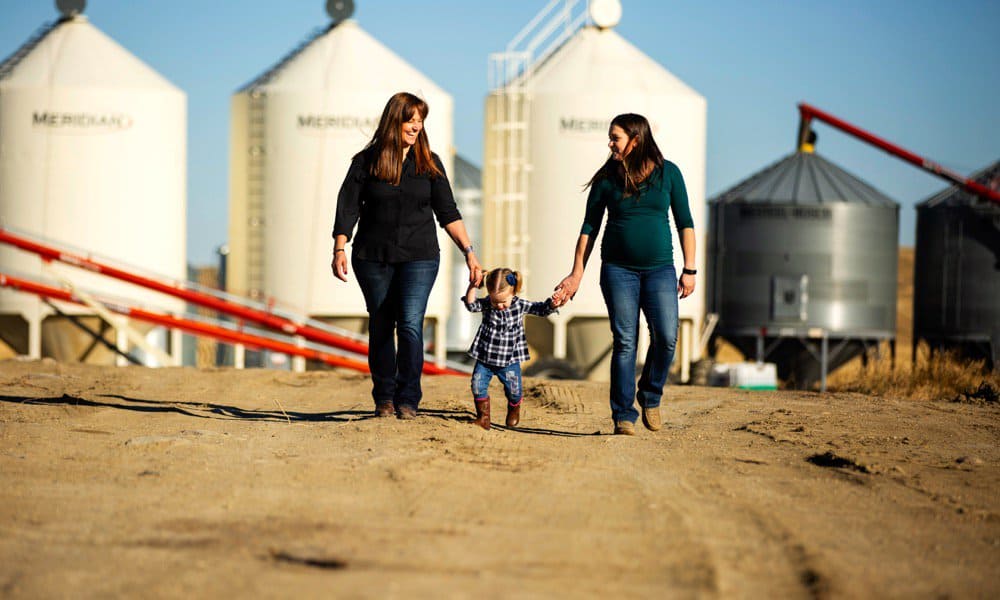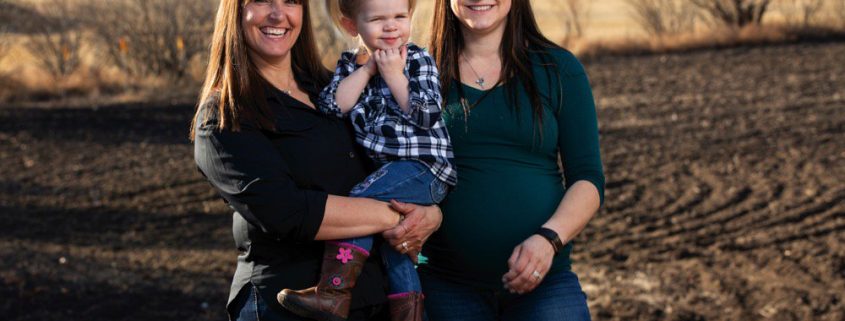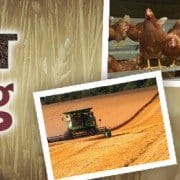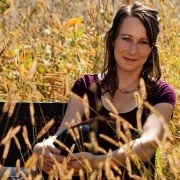Turning girls into farmers
Should you raise daughters differently to succeed at farming? This mother, daughter and granddaughter know their answer
By
No matter how progressive we think agriculture is becoming for ourselves, for our wives and for our daughters, there’s still a prevalent attitude that farming is “men’s work.”
Now a new ethos is gaining ground, and anyone who subscribes to the men’s-work way of thinking is being asked — well, ordered really — to get over themselves.
Farming excellence, we’re told, is no longer predicated on the farmer’s muscle strength. Instead, success takes multi-tasking, management, problem solving — areas where women excel at least as often as men.
With the demands ahead, our industry’s priority should be attracting the best and brightest of the next generation, regardless of gender. How can we do that? To find out, Country Guide sent me to talk to the experts: three generations of women from one farm family, all of whom identify solidly as “farmer.” Here is what I learned. — M.B.
Bev Shewchuk can pinpoint the exact moment she realized she’d had enough of not being taken seriously as a farmer. She and husband, Brad, had gone into the local bank to talk financing. Even though she carried the majority of the farm management including all of the day-to-day operating of the farm while he worked away, she waited until he was home from the oil field to make the trip into town since they always did the major farm decision-making together.
When the financing officer handed the couple their completed paperwork, Brad’s occupation was described as “farmer.”
Shewchuk, despite the fact that the couple had clearly described the partnership of their operation, was listed as “housewife.”
“Even though I was 100 per cent engrossed in the farm,” she says, “and even though I made all the decisions with the cattle and sheep, and even though I did every bit of the work when Brad was away, I was still a farmer’s wife even in my own mind until that moment.
“That was my turning point, the moment when I really changed my attitude about my own role on the farm.”
Shewchuk has been farming for five decades. One of four sisters, she had grown up on what was considered at the time to be a mid-sized, mixed production farm. Shewchuk was mostly single-parented: first by her mom who ran the family farm while her dad worked away from home, and then, after her parents’ marriage broke down, by her farmer dad who, in the absence of sons, taught his girls every aspect of farming life.
Her earliest career goal was to be a mechanic — a handy aspiration given the amount of time she now spends fixing equipment on the farm.
At 21, she married Brad and transported her knowledge and work ethic to his family’s farm. That was no surprise, really. Taking over her family’s farm wasn’t even on the radar.
“When I was growing up, (a daughter taking over the family farm) wasn’t even a thing. We were either going to marry a farmer or go away to find a different job. Even when my kids were little, there was the thought that if we didn’t have any boys, there’d be no one to pass the farm on to,” she says.

“My priority wasn’t to raise farmers; it was to raise strong daughters who could look after themselves and not have to rely on anyone.” – Bev Shewchuk. photo: David Stobbe
Daughters — first Stacey, then twins Kendi and Carly — came in quick succession. To support the family, Brad went to work in the oil field as a directional driller in Canada and the U.S. Shewchuk stayed behind to keep the farm and family running, spreading her time between parenting, working as a teacher’s aide then secretary at the local school, and managing 40 cows, 300 sheep and two quarters of grain.
Raising daughters to farm
“I don’t think I thought about raising daughters to be farmers. It was just something that happened. My priority wasn’t to raise farmers; it was to raise strong daughters who could look after themselves and not have to rely on anyone.
“I’ve always taken pride in being independent,” Shewchuk says. “I don’t like asking for help. If something breaks and needs fixing, I’ll figure out how to fix it. I wanted my girls to be able to do that too.”
She soon discovered, though, that as a farm parent, guilt and pride went hand in hand. The girls had all kinds of benefits from farm life but because there was always more work to get done, they missed out on some of the things other kids had time to do.
“Any good parent always feels like they’re not doing a good job. Sure, I’d take the kids to swimming lessons but when the lesson was done and everyone else got to stay after to just swim for fun, we’d have to get home because I needed their help to get farm jobs done. I had a lot of guilt about what they missed out on.”
The flip side of that, though, is that the girls grew up capable and confident.
“When my mother-in-law got ill in the middle of lambing, I had to go, so I told the girls they were in charge of the lambing. Stacey was maybe 12. She called me a while later saying, ‘Mom, there’s a sheep with a leg sticking out.’ I said, ‘If that lamb’s not out in 20 minutes, you’re going to have to go in and get it.’ That’s what farming is: living life and having to do what you have to do.”
Some 15 years later, Shewchuk’s 12-year-old lambing pro is all grown up, married and now a mom herself to a two-year-old named Georgia, with another due to arrive as this story goes to print. Stacey (now Stacey Sagon) is a crop inputs manager at an inland grain terminal with Parrish & Heimbecker, Ltd. and farms about 2,000 acres of grain and oilseeds near Biggar, Sask., with husband Mark.
“We started farming together. It’s fairly unique in this day and age but we didn’t take over a farm from family. Mark’s first drill, we bought it at an auction sale when we were dating,” Sagon says. “If we wanted to spend time together, we were on the farm, picking rocks, fixing equipment, running to the dealership to grab equipment parts. We’ve been side by side right from the start.”
Since they’ve been married, they’ve each and together invested all of their money into the farm, so they are individually and jointly committed financial contributors to the business.
It’s two careers
On the farm, Sagon describes her husband as CEO and herself as CFO, i.e. vital and equal but not identical jobs. Final decisions get made together, but they have their roles.
In addition to handling all the financials and administrative management, Sagon also leads on the farm’s agronomy and grain marketing initiatives because of her knowledge and off-farm job.
“Women today, they aren’t just farmers’ wives. Many identify as farmers; I know I do. As farms are more profitable, there’s space for both the husband and the wife,” she says.
Currently, she works off-farm to supplement the family income. This winter, that will change when she takes maternity leave for the new baby.
“We can’t afford for us to both be home, so I keep giving him a hard time that he needs to find off-farm work in the winter.”
Five years ago, Sagon joined Saskatchewan Women in Ag. Today, she is proud to be vice-chair of the organization as well as its partnership chair. She’s also on the board of the Western Applied Research Corporation’s local research farm.
She and Mark voluntarily invest their time into the industry because they know their input and leadership can make a difference. Meanwhile, Shewchuk, too, is involved, putting her name forward for the Sask Canola elections.
“I’ve gone to meetings and sales and felt intimidated because I was the only woman there,” says Sagon. “I think of myself as a strong person. If I’m feeling intimidated, like I don’t belong, what does a younger, less confident woman feel?
“It may be scary and uncomfortable but you have just as much right to be there as anyone else in that room. Women who feel that support behind them, even when no one is standing right beside them, will do great things for this industry.”
It’s not just women who have an important role in supporting women in agriculture. Both Sagon and Shewchuk’s husbands have wholeheartedly subscribed to the “of course girls can” concept.
Brad Shewchuk taught his girls to change shovels on the cultivator, expected them to pick rocks and sling hay, and talked shop with them as naturally as if they were boys. Mark Sagon is following suit.
“He calls Georgia his little farmer,” says Sagon. “She gets pulled along all the time. She was with him in the combine this morning, both because there’s no day care today and because we love the lifestyle.”
Respect at home
Both generations of husbands have always treated their wives as full partners and valued colleagues, and their spouses say it gets noticed.
“Brad has a lot of respect for me and for what I can do,” says Shewchuk. The couple are no longer raising livestock, and have cut their combined cereals and oilseeds to 1,200 acres. “I’ve never felt that he looked at me as though I wasn’t able or capable. Our daughters have obviously seen that all the way along — they grew up understanding that their parents are equals. We each have strengths that contribute to our success.
“How women are viewed in all industries is different now… when we go to the local NAPA store, my husband says ‘I want to talk to Ashley because she knows what she’s talking about.’ We’re moving towards the world being about ability instead of gender.”
Sagon agrees, but says she still sometimes has to fight for respect. “We were shopping for grain trailers at Ag in Motion. I’d ask a question and the sales guy would look right past me and say the answer to my husband, totally negating me. I gave Mark a look which inspired him to say: ‘I’m the wrong person. She’s the one you need to convince. She’s the one signing the cheque.’”
Being devalued on the basis of gender is still something that happens to Sagon at work, too.
“I’m usually the only female at a conference call or in a meeting. It’s not always overt comments but some guys will definitely minimize the knowledge I have; they’ll definitely act like ‘Well, how would you know?’
“How would I know? Because I’ve lived farming my whole life, and because I went to school for this, and because I have a lot of experience doing this job.”
How, exactly, does she recommend women deal with it? In addition to calling people on their misconceptions, which is sometimes necessary, she says being treated unfairly makes her work harder.
“In any industry you have to prove yourself. You have to make sure you study up and you know your stuff. Being female can be an obstacle that you sometimes have to overcome. But being young is the same — people will treat you like you don’t know anything because they’re older than you.”
It’s all about having confidence in your right to a position.
“There’s a place for all of us in agriculture. I can sit in board rooms and auction markets and, even if I’m the only female there, I can fit in. Maybe some of the other people there don’t like it but that’s their problem — I know I belong there.”
Proving yourself
Hearing Shewchuk describe her life on the farm, it’s hard to imagine that anyone could mistake her for anything other than a full-fledged farmer. Still, she admits to a bit of a hold-over feeling of needing to prove herself.
“I still feel that self-conscious part, that I don’t know enough. My husband, if he calls a mechanic and doesn’t know what the mechanic’s talking about, he’ll just tell him that. I feel that little bit of embarrassment that I have to ask, as though I should know, or as though if my husband were the one talking about it, he’d know. That’s something I wish would be different for girls today…they are worthy of professional respect.”
When that banker wrote “housewife” as Shewchuk’s job description, something big shifted. To be honest, it wasn’t the first time someone had undervalued Shewchuk’s role on the farm. She’d been asked 1,000 times or more the demeaning: “Do you work?” question, a question her husband has never had to answer. And when calling the farm, farm reps used to regularly ask to speak to her husband, assuming she couldn’t be a farm decision-maker, couldn’t know the answers to any of their questions.
“I guess maybe we didn’t say anything back then. I thought it didn’t matter. But it does matter. It’s a respect thing. I was working just as hard as my husband and the assumption was that I’m not involved in the farm because I’m female. I was being dismissed,” she says.
But that day at the bank, Shewchuk knew she was finished with being undervalued.
“Maybe it was the way I carried myself. Maybe once I realized the problem, I carried myself differently. All I know is I’ve never been asked ‘Do you work?’ since then; never had to justify my role on the farm.”
The only advice she’d give her daughters is to raise their children as strong, competent individuals regardless if they’re boys or girls.
“Give them all the tools you can. If they decide to grow into a farmer, that’s wonderful. I’d tell them to do what their heart tells them to do.”
Two-year-old Georgia doesn’t worry too much about whether she’ll be taken seriously as a farmer when she grows up. For now, her bigger concern is whether she gets to ride in the combine with Dad again tomorrow. Oh, and also what snacks he’s going to bring along for her. A strong woman knows it isn’t supposed to all be work.
Source: Country Guide. Written by





 CleanFarms
CleanFarms 


